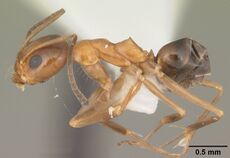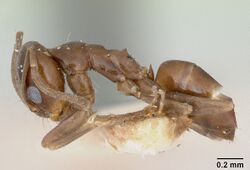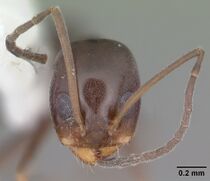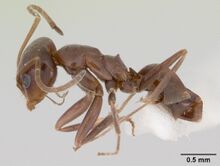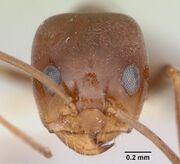Key to Nearctic Dorymyrmex
This worker key is based on: Snelling, R. R. 1995a. Systematics of Nearctic ants of the genus Dorymyrmex (Hymenoptera: Formicidae). Contributions in Science (Los Angeles, Calif.). 454:1-14.
Please be aware this genus in the Nearctic is fraught with problems in delimiting and determining species. Snelling's view of the genus, for example, appears problematic for the southeastern US. In this region, Deyrup (2017) prefers to adhere to the conclusions of Trager (1988) (Key to Dorymyrmex of SE United States) while also noting many questions remain regarding species identities in this genus.
You may also be interested in
1

- Mesonotal profile, in all or nearly all individuals from same nest, evenly convex (Figs. 11, 20) or flat to weakly concave (Fig. 22) . . . . . 2
- Mesonotal profile, in all or nearly all individuals from same nest, with distinct dorsal and declivitous faces that meet in more or less well-defined angle (Figs. 18, 19) . . . . . 4
2
return to couplet #1
- Promesonotal profile convex, base of propodeum angled 1450 or less to plane of posterior ponion of mesonotum (Figs. 11,20); scape surpassing vertex by no more than 0.33 times its length (Fig. 10); color various . . . . . 3
- Promesonotal profile flat, base of propodeum angled 1650 or more to plane of mesonotum (Fig. 22); scape surpassing vertex by nearly 0.5 times its length; color uniformly clear yellow (gastral apex sometimes darkened) (Florida) . . . . . Dorymyrmex elegans
3
return to couplet #2
- Head (Fig. 10) broad, CI over 87 (less in some minor workers); scape relatively short (SI less than 112); propodeal tubercle blunt, posterior face straight or slightly convex (Fig. 11); color largely yellow or reddish yellow but if head and gaster infuscated, then mesosoma also infuscated (Maryland to Florida, west to eastern Texas) . . . . . Dorymyrmex bureni
- Head narrower, CI less than 87; scape relatively longer, (SI at least 112 in 95% of individuals); propodeal tubercle sharper, posterior face slightly concave (Fig. 20); head and gaster brown, mesosoma clear yellowish (Florida) . . . . . Dorymyrmex flavopectus
4
return to couplet #1
- Front of head and discs of gastral terga 1-3 shiny, with only obscure sparse to scattered appressed pubescence . . . . . 5
- Front of head and discs of gastral terga 1-3 only moderately shiny, with abundant appressed pubescence that partially obscures surface and imparts silky sheen to surface in oblique view . . . . . 7
5
return to couplet #4
- Posterior face of mesonotum distinctly sloping in profile (Figs. 17, 18) . . . . . 6
- Posterior face of mesonotum nearly vertical in profile (Fig. 19) (Florida and Georgia) . . . . . Dorymyrmex bossutus
6
return to couplet #5
- Propodeal tubercle short and preceded by transverse crease (Fig. 18); disc of gastral tergum 1 slightly shiny, distinctly roughened (Arizona) . . . . . Dorymyrmex wheeleri
- Propodeal tubercle relatively higher and not preceded by transverse crease (Fig. 17); disc of gastral tergum 1 smooth and shiny (Texas) . . . . . Dorymyrmex lipan
7
return to couplet #4
- Head relatively narrow, CI usually less than 88, rarely as much as 90; vertex margin straight or slightly convex (Figs. 4, 7); eye relatively large, 100 usually less than 1.50 (never over 1.70) times EL and EL equal to or exceeding OMD; female unicolorous yellowish or brownish . . . . . 8
- Head relatively broad, CI over 90; eye relatively small, 100 at least 1.75 times EL, OMD at least equal to, and usually greater than, EL; vertex margin usually distinctly concave in frontal view, rarely straight; female head and mesosoma red, gaster blackish . . . . . 10
8
return to couplet #7
- Propodeal tubercle relatively prominent; pronotum usually with discal seta pair, or, if absent, color distinctly yellowish (west of Mississippi River) . . . . . 9
- Propodeal tubercle short (Fig. 21); pronotal disc without erect setae (Illinois?, Michigan?, New Jersey, south to Florida and Alabama) . . . . . Dorymyrmex grandulus
9
return to couplet #8
- Color light to dark brownish, head and gaster commonly darker than mesosoma; pronotal seta pair usually present (Kansas to central Texas, west to southern California) . . . . . Dorymyrmex insanus
- Color clear yellowish to reddish yellow, often with vertex, mesosomal dorsum, and apex of gaster infuscated; pronotal seta pair commonly absent (Kansas and eastern Colorado to southern Texas, eastern New Mexico, and western Louisiana) . . . . . Dorymyrmex flavus
10
return to couplet #7
- Head and mesosoma black or dark brown . . . . . 11
- Head and mesosoma red (western Texas to southern Nevada and California) . . . . . Dorymyrmex bicolor
11
return to couplet #10
- Vertex, in frontal view, distinctly concave (Fig. 4) (North Dakota south to eastern New Mexico and western Texas, east across southern states to North Carolina, Georgia, and Florida) . . . . . Dorymyrmex smithi
- Vertex, in frontal view, straight or weakly concave (Fig. 14) (Utah) . . . . . Dorymyrmex paiute









